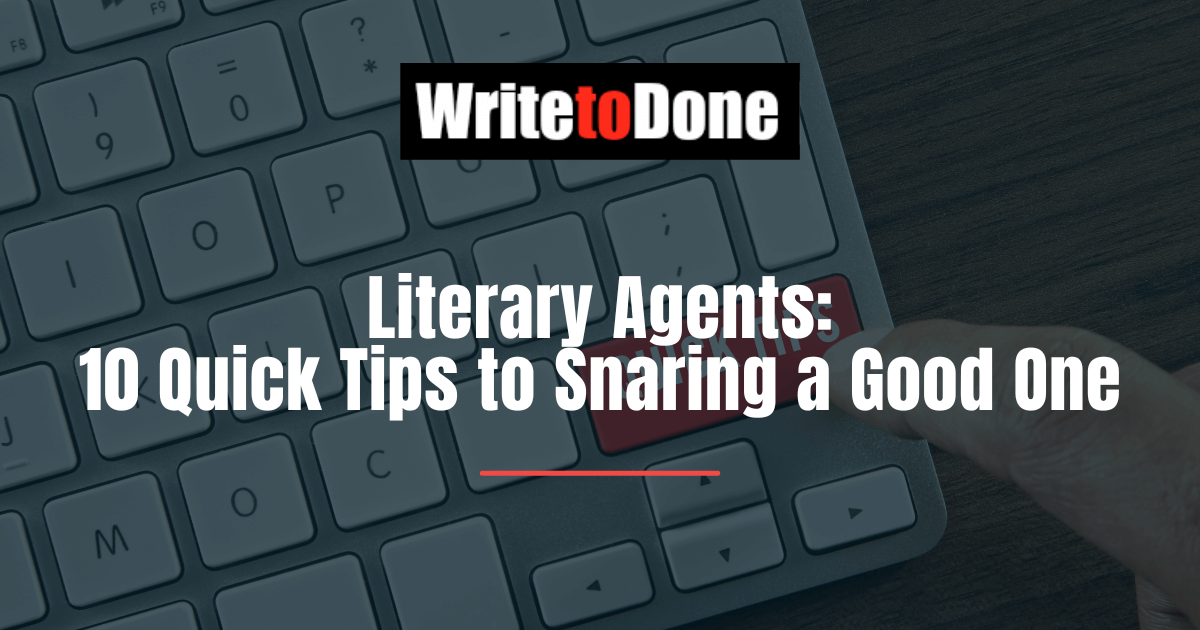Editor’s Note: Today’s post is from Barbara Poelle. As vice president of a literary agency herself, she understands exactly what it takes to get the interest of literary agents. And, with hundreds of manuscripts landing on agents desks week in, week out, she also understands just how quickly you need to hook an agent’s attention. So here are 10 quick tips to do just that – oh, and to make sure it’s a good agent you’re hooking 🙂
So, you’ve made your 2020 resolutions- this is the year you get an agent and get that book deal! I’m with ya! These shoes don’t buy themselves, so let’s set you up for success because I have my eye on some peep toe Pradas.
First and foremost let’s go over the key components necessary for a successful submission and review process. Your query letter is your novel’s resume, and you would never head to a job interview with a shoddy resume, so let’s make sure your book has the same professionalism and pizazz. So… How’s your query looking? Is it including all of the meat with very little fat? A quick and easy recipe for making sure you are serving your novel up perfectly- your query should consist of:
- The Hook: An intro including logline (a one-sentence refined summary that boils the work down to its broadest definition, word count, and genre. This is also a good point to include any comparable titles: “This is ___ meets __”).
- The Book: Four to five sentences explaining the premise.
- The Cook: A bit about the author. Basically: Why this book, why me, why now.
If you can check these boxes, let’s take a look at the pages themselves. Most agencies are looking at the first ten pages and a synopsis of your work. SO:
4. How is your first line? They are so important! We want that first line to drop the hook in the agent’s mouth and pull. A quick and easy litmus test: go your bookshelf and pull several titles and read the first line out loud. (Some of my personal favorites are Sena Jeter Naslund’s AHAB’S WIFE, Andy Weir’s THE MARTIAN, Lee Childs’ KILLING FLOOR, and Graham Brown’s BLACK RAIN.) Take a beat to assess what works about the opening line. Does yours deliver as well?
5. After you’ve hooked us with that first line, we are turning our attention to the first ten pages of the manuscript, so are those first ten pages in the best shape possible for literary agents to look at? Are they giving a hint that whatever to come is unputdownable?
6. Finally, how is your synopsis? It should be three to five paragraphs, and get into more about the characters and their conflicts. It is not a detailed pitch, but a true summary. Thus it should explain the full story arc, sometimes even including a solid hint at the ending, even if it’s with that old chestnut “and a twist that [the character] never saw coming”.
We’re at the checkered flag, one last round we go…before you start your submissions, let’s crash course a couple of OTHER flags to make sure you are communicating with reputable agents:
7. Reading Fees:
GREEN FLAG Reputable literary Agents will confirm that they only get paid when you get paid. No legit agent will ask for a reading fee. Ever, at any point. We get paid when you get paid. Period.
RED FLAG An agent that has a conversation about fees at the submission stage.
8. Media presence:
GREEN FLAG: Reputable Agents will have a website or at least a page on Publishers Marketplace detailing clients and sales.
RED FLAG: An agent who reaches out through a social media account with no other media presence.
9. Submission Plan Specifics:
GREEN FLAG: An agent should be able to tell you which imprints—and sometimes even specific editors—she is considering sending the book to, and why.
RED FLAG: An agent who says broad terms concerning submissions like “Harper Collins” or “Publishers”. An agent who says they want to represent the work based on the query or before they have read the full manuscript.
10. References:
GREEN FLAG An agent should connect you to another client(s) as reference upon offering representation.
RED FLAG: An agent that makes excuses on why you cannot speak to any current client.
Literary Agents: Go nab a good one
Okay, grab your resolve and start your resoluting! I’ll be peeping my peep toes waiting for your query!
















